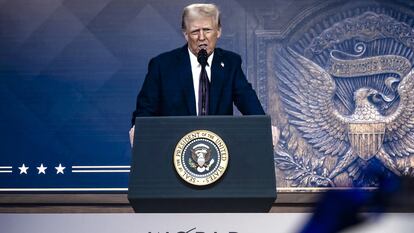Trump calls on NATO countries to raise defense spending to 5% of GDP and accuses the EU of treating the US ‘very badly’
The U.S. president tells Davos Forum he wants to meet Vladimir Putin soon and has asked Xi Jinping to help stop Ukraine war


U.S. President Donald Trump presented his plans to participants at the Davos Forum in Switzerland on Thursday, outlining his dissatisfaction with the EU’s treatment of the United States in economic matters and announcing that he will ask NATO allies to spend 5% of GDP on defense, three percentage points more than the current target
“I’m trying to be constructive, because I love Europe,” Trump said in his speech via videoconference from Washington. “From the standpoint of America, the EU treats us very, very unfairly, very badly,”
He went on to explain the reasons for his complaint, largely focusing on a trade relationship he views as unfairly imbalanced, while also criticizing fines imposed on U.S. companies for alleged violations of free competition rules, which he described as a form of hidden taxation. “So, we have some very big complaints with the EU,” said Trump.
The dissatisfaction on the economic front adds to Trump’s concerns about the military spending of many NATO partners, particularly in Europe, which he believes is insufficient. He made his demand clear, calling for a significant increase in defense spending. “I’m also going to ask all NATO nations to increase defense spending to 5% of GDP,” he said, arguing that the limited contributions from others represent another way in which the U.S. is taken advantage of. The pursuit of what he described as “fair” relations — especially through the lens of trade balance and military contributions — lies at the heart of his approach to international relations.
In his speech, which was followed by a Q&A session with four prominent business leaders, Trump expressed a desire “to meet with President [Vladimir] Putin soon” to push for an end to the hostilities in Ukraine. He also noted that he had raised the issue during his recent phone conversation with Chinese President Xi Jinping. “Hopefully, China can help us stop the war between Russia and Ukraine. They have a great deal of power over that situation, and we’ll work with them. I mentioned that during our phone conversation with President Xi,” he said.
On the domestic front, Trump insisted that he is leading “a revolution of common sense.” He reiterated his commitment to carrying out “the largest deregulation campaign in history” and delivering “the largest tax cut in American history.”
The culture war also surfaced in the speech, with Trump promising to abolish all “nonsense” measures promoting diversity, equity, and inclusion, which he labeled as “discriminatory.” He vowed that under his leadership, the U.S. would once again become a country governed by merit. Overall, the references to the cultural battle were minimal compared to the singular focus of Argentine President Javier Milei’s speech earlier Thursday morning.
Throughout his speech, Trump’s transactional approach to international relations became evident. He referenced reports of an alleged Saudi project to invest around $600 billion in the U.S. “I’ll be asking the crown prince, who’s a fantastic guy, to round it out to around $1 trillion. I think they’ll do that because we’ve been very good to them,” said Trump.
The president’s comments were likely a nod to Crown Prince Mohammed bin Salman, whom the Biden administration has linked to the dismemberment of journalist Jamal Khashoggi in a Saudi consulate in Turkey. He was not the only authoritarian leader praised by Trump, who also said he likes Xi Jinping “very much.”
“I’m also going to ask Saudi Arabia and OPEC to bring down the cost of oil,” Trump continued. He argued that reducing oil prices — thereby limiting Russia’s revenues — could potentially end the war in Ukraine.
Following the initial 15-minute speech, Trump took questions from four business leaders —Ana Botín, president of Banco Santander; Stephen Schwarzman, chairman of Blackstone; Brian Moynihan, CEO of Bank of America; and Patrick Pouyanné of Total Energies. Both Botín and Schwarzman expressed their appreciation for his deregulation agenda and inquired about it, though Trump did not delve into further details. Botín took the opportunity to briefly present her bank to Trump, who responded by saying she had done a “fantastic job.” The exchange with Moynihan, however, was less fluid, with Trump criticizing U.S. banks for failing to adequately extend credit to conservatives.
Sign up for our weekly newsletter to get more English-language news coverage from EL PAÍS USA Edition
Tu suscripción se está usando en otro dispositivo
¿Quieres añadir otro usuario a tu suscripción?
Si continúas leyendo en este dispositivo, no se podrá leer en el otro.
FlechaTu suscripción se está usando en otro dispositivo y solo puedes acceder a EL PAÍS desde un dispositivo a la vez.
Si quieres compartir tu cuenta, cambia tu suscripción a la modalidad Premium, así podrás añadir otro usuario. Cada uno accederá con su propia cuenta de email, lo que os permitirá personalizar vuestra experiencia en EL PAÍS.
¿Tienes una suscripción de empresa? Accede aquí para contratar más cuentas.
En el caso de no saber quién está usando tu cuenta, te recomendamos cambiar tu contraseña aquí.
Si decides continuar compartiendo tu cuenta, este mensaje se mostrará en tu dispositivo y en el de la otra persona que está usando tu cuenta de forma indefinida, afectando a tu experiencia de lectura. Puedes consultar aquí los términos y condiciones de la suscripción digital.








































